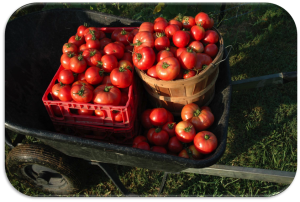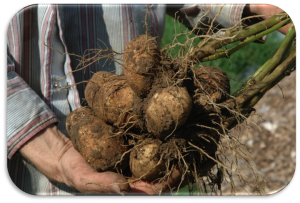By Laurie Marshall

As I was growing up, we visited my grandparents’ farm in Goshen every summer and for either Thanksgiving or Christmas. We sat around a big oak table, ate a bountiful meal that was raised within spitting distance of the kitchen, and learned the difference between fresh tomatoes and those offered by the local grocer’s produce department. Grandma and Grandpa also sold at the Fayetteville Farmers’ Market – handmade crafts and locally raised white clover honey. To die for. Seriously.
Grandma canned all kinds of things – beans of every color, tomatoes, pickles (although they were not her best work), corn, fruit… if it was growing in her garden, she could can it. She also froze a lot. Berries and corn worked great frozen. And they raised their own beef, and had chickens laying eggs. Interestingly, there was no fresh milk on the farm. Which was fine with me. I tried some at my cousin’s house once and was not impressed.
As I write this I do have pots outside my window that contain tomato and pepper plants, and a fair selection of herbs (except for the rosemary bush that I murdered when I tried to relocate it). But I do not pretend to have anything close to a garden that could actually produce enough of any one vegetable to provide for more than a couple of meals. I know I’m not alone. We WANT to feed our families healthy food. Dare I say “organic”?? But we might be a little bit clueless about what, exactly, constitutes “organic” and when it comes down to it, it’s just easier to buy my veggies in the same place where I buy my dog food, toilet paper, and Diet D.P.
That’s where the Farmers’ markets of Northwest Arkansas come in. Fayetteville is close to my heart, obviously, but Bentonville is getting a decent market off the ground as well, and Springdale has a smattering of vendors on Saturday in the Jones Center parking lot. I don’t think there is a better way to eat healthy than to buy produce directly from the farmer who planted it, cared for it, and harvested it (usually, that morning!). And it’s not just veggies! The market in Fayetteville even has vendors who sell fresh eggs (chicken and duck), pork, and goat cheeses. Add the hot cup of coffee from Arsaga’s or Jammin’ Java and a bouquet of fresh flowers to your morning and I can’t think of a better way to spend an hour on a Saturday.
But what if you don’t want to drive to the square, find a parking spot, dodge dogs and strollers and folks who are socializing… you just want to pick up some spinach and eggs for your lunchtime frittata and some peppers for tomorrow’s stir fry? Well, you could go to the market at the Botanical Garden of the Ozarks on Sunday morning. The crowd is a lot smaller, but the produce and other goodies are still awesome. Parking is easier as well. But what I want to let you in on is a relatively new (and perhaps unfamiliar to you) program called Community Supported Agriculture (CSA).
A CSA is exactly what it sounds like – a farm that is supported not solely by the farmer working the land and managing the harvest, but by the community that supports it with their financial investment. A CSA farm sells “shares” in their season and the subscriber’s investment pays for the operation of the farm that season. They are, in essence, putting cash in the coffers for the farmer to be able to do what he does without as much worry about money early in the season. In return for the financial investment, the subscriber receives a box or bag or basket full of delicious goodies on a regular basis. Some farms have a standard box that everyone gets, others let you decide what, out of their projected harvest or the week’s pickings, you want to get in your box.
One of the coolest things (I think) about being a part of a CSA, is that you get to KNOW your farmer. Going to the market and meeting them is nice, but if you’re seeing them every week you are truly in touch with what is going on where your food is being grown. How awesome is that? And most of them will let you come hang out at the farm during the season to see how the operation works. For more great info on what a CSA is and does, check out LocalHarvest.org. They have tons of information on their site, and you can search for farms close to you as well.
Some things to consider if you are looking for a CSA to invest in:

Who are the farmers? How long have they been doing this, what is their actual farming experience? And what is their plan for the next several years? If you are talking to someone who is really excited about the idea of running a CSA but can’t really point to any experience growing things or plans for coming years, you might want to give them a pass for now. I mean, a lot of people think it would be “fun” to run a farm full-time rather than go to an office Monday-Friday. But the reality of what goes into a successful growing operation can be seriously off-putting to someone without a lot of experience in the field. You’re making an investment – do it wisely.
What crops are being grown? This is particularly important if you have a picky family or if there are only a couple of you living at home. The last thing you want is to get several weeks of boxes full of collard greens and beets and onions if none of those things are popular at your house, or if you won’t cook them often enough to use them all. Don’t be afraid to pass on a great farm just based on the crops – no one wants food to go to waste, especially the farmer who grew it!
What are the delivery/pick up options? Some farms leave boxes on their front porch for you to pick up, others deliver to your door. Many have pick up locations in several places around the area to best serve all of their subscribers. Just be sure that you know how this works for the farm you’re considering before you sign up. Otherwise, you may find yourself having to drive a “fer piece” once a week to get your box.
Are they organic? Some people won’t care as much about this. In fact, the vendors at the Farmers’ Market are not even all organic. Those who are should have a little sign posted saying so – if you’re not sure, just ask. If it matters to you what is used to kill bugs and fungus on your veggies, this is definitely a question that needs to be asked.
I have put together a (VERY SMALL) list of local CSA farms. There may very well be more out there, but these folks are on the ball and have websites that were easy to find. That’s the kind that get listed in my posts. Check out each site – some farms offer duck and chicken eggs, at least one offers pork, another provides local honey every couple of weeks – it’s a smorgasbord!
- Mason Creek Farm
- Oak Hill Farm
- Sycamore Valley Farm
- Dripping Springs
- Ozark Alternatives
The time to subscribe is now – these folks will fill up fast, if they are not already closed for the season’s shares. If you do sign up, I hope you’ll come back here and let us know how you found your experience. Happy, healthy eating!!
 Look for Laurie’s fitness tips and updates on her personal health-focused journey every other Friday on nwaMotherlode in Mom Blogs. Send questions or input to her at mamas@nwaMotherlode.com. Or click on the comment button below and share your thoughts right now! To see previous installments of Getting Healthy for Good, click HERE.
Look for Laurie’s fitness tips and updates on her personal health-focused journey every other Friday on nwaMotherlode in Mom Blogs. Send questions or input to her at mamas@nwaMotherlode.com. Or click on the comment button below and share your thoughts right now! To see previous installments of Getting Healthy for Good, click HERE.

This is a great write-up. Thank you so much for making the effort to describe all of this out for folks. It really is a great help!
I found this listing on LocalHarvest.org for some farmers’ markets in our area. Springdale is not listed here, but I am pretty sure it’s still going on. http://www.localharvest.org/search.jsp?map=1&lat=36.180785&lon=-94.167717&scale=9&ty=1&zip=72762
and you’re welcome Rayford!
Just found this: “Quinn Montana, author of the book “Worship Your Food” will be discussing the problems of our conventional food system and how to have a healthier life. This is a free lecture at 10 am this coming Sunday (June 19th) at St. Paul’s Episcopal Church.”
I haven’t read her book, but if you’re interested in new thoughts on healthy eating it might be interesting. 🙂
Another link to a local CSA – this one has pick up available at the Bentonville Farmers’ Market. There were only a few subscriptions left as of Sunday but go take a look http://thefarm.cobblestoneproject.org/harvest-share-subscription/